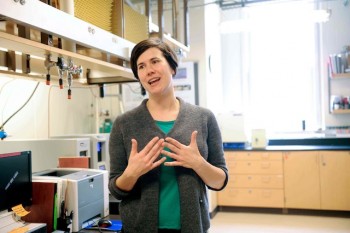Helen White Awarded Grant for Oil Spill Research

Details
Assistant Professor of Chemistry Helen White has been awarded a substantial grant from the Gulf of Mexico Research Institute (GoMRI) to continue her research on the impact of the Deepwater Horizon oil spill.
White was the lead author on a study published in March in the Proceedings of the National Academy of Sciences USA that presented compelling evidence of the Deepwater Horizon oil spill's impact on deep-sea coral communities. That study was based on data and samples collected during a research cruise to the Gulf undertaken by a diverse team of 14 scientists from five institutions. White, a geochemist, observed the corals up close during a dive on board the deep submergence vehicle Alvin. Returning to the lab, she worked with scientists from the Woods Hole Oceanographic Institution (WHOI) to use advanced technologies to determine the source of the oil found in the damaged coral communities. After its publication, the study and its unprecedented findings became a news story that was picked up by more than 400 media outlets around the world.
Now White will have the opportunity to further the scientific understanding of the oil spill's effect on the deep ocean. She and research partner Elizabeth B. Kujawinski of WHOI will receive $1,053,159 over two years to fund their study,“Weathering of Petroleum and Dispersant Components in the Aftermath of the Deepwater Horizon Oil Spill.” Kujawinski, a chemical oceanographer, last year published the first study of the chemical dispersants used to mitigate the spill. The paper revealed that the dispersant had still not degraded some three months after it was applied.
White and Kujawinski's new project, one of just 19 to be funded by GoMRI from among a pool of more than 600 applicants, will examine the chemical evolution and biological degradation of oil and dispersants in the water-column and deep-sea sediments in the Gulf of Mexico to determine their interaction with deep-water ecosystems. According to White, the project will utilize ultra-high resolution mass spectrometry to determine the composition of polar oil and the dispersants in water samples that were collected after the spill. The researchers will also employ new methods of liquid chromatography mass spectrometry to quantify the dispersants in water and deep-sea sediment samples.
In her lab at Haverford, White and her students will focus on quantifying the total oil in samples and assessing the extent of biological activity that may be changing the oil. Of particular interest is the ability of the resident microbial community to metabolize oil.“We hope to gain a better understanding of what happened chemically to the oil and the dispersants after the Deepwater Horizon disaster Mexico, as well as how the fate of these components may have been altered by micro organisms,” says White, who directs the Tri-College Environmental Studies Program at Haverford.
White's investigation of the Deepwater Horizon spill continued this summer with the help of three Haverford students, Patrick Williams '14, Katie Sheline '13 and Elizabeth Willis '13, who worked with her as research assistants. The team made three separate trips to the shores of the Gulf of Mexico to collect oil samples that are still washing ashore in the form of sand patties. In all, they collected 200-plus samples and had analyzed 61 of them by summer's end. (The group chronicled their research and travels on a blog: http://news.haverford.edu/blogs/hkwlab/)
This work was largely funded by the Koshland Integrated Natural Sciences Center at Haverford, which supports student research through a program of summer stipends and travel grants. The research was done in collaboration with the GoMRI-funded consortium DEEP-C.
The Gulf of Mexico Research Institute was created in May 2010 after BP committed up to $500 million over 10 years to fund an independent research program designed to study the impacts of the oil, dispersed oil, and dispersant on the ecosystems of the Gulf of Mexico and the affected coastal states. GoMRI supports projects that can help improve the fundamental understanding of the dynamics of oil spills and their environmental stresses and public health implications, as well as develop improved detection and remediation technologies. GoMRI funds are distributed using peer evaluations and are used strictly for research activities such as sampling, modeling and studies. All research is published in peer-reviewed scientific journals with no requirement for BP approval. To date, more than $130 million in funding has been distributed.
“I am very pleased to be funded by GoMRI and to be able to continue my
 research group's work in the Gulf of Mexico,” said White.“I look forward to
 collaborating with Liz, as well as other scientists, many of whom are from Gulf state institutions. I am also thrilled that GoMRI is providing support for undergraduate students to be directly involved in this research. Engaging students in this timely and important issue has the potential to play an important role in their education and future careers.”
—Eils Lotozo



